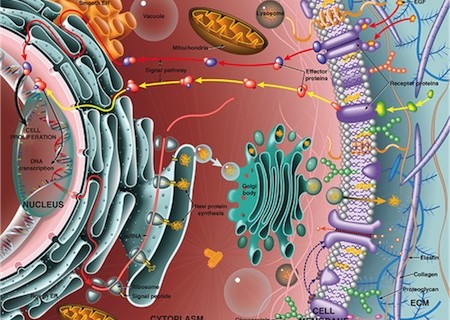
Increasing Protein Production with Novel Cell-Ess Titer Boost without Affecting the Metabolic Profile
In this mini-webinar, Adam Elhofy, PhD, CSO, Essential Pharmaceuticals, presents data summarizing the findings of a recent study “Novel Cell-Ess ® supplement used as a feed or as an initial boost to CHO serum free media results in a significant increase in protein yield and production” published in Computational and Structural Biology Journal (Volume 14, 2016, p. 319-324) The study focuses on the use of a novel media supplement called Cell-Ess that increases protein productivity via yield per cell while not impacting the metabolic profile via a unique lipid delivery mechanism. Dr. Elhofy initially gave this talk at Boston Biotech Week 2016, and we are excited to be able to share it on the Cell Culture Dish.
Dr. Elhofy begins his presentation by providing an overview of how protein is made. This is an important point as it provides a good basis for understanding the possible mechanisms of action for Cell-Ess and why it is effective. Essentially, he explains how all the protein synthesis and secretion functions of the cell occur on lipid membranes.
Using Cell-Ess to increase titer without affecting the metabolic profile
What is Cell-Ess?
- Chemically defined, Animal component free universal titer boost and optimizer
- Provides experimental control
- Manufactured under GMP guidelines
- Consistent, reproducible cell behavior lot to lot, experiment to experiment.
- Unique lipid delivery technology allows it to be used as a feed in combination with other supplements and feeds
After describing the titer boost, Dr. Elhofy explained that by adding Cell-Ess you can improve lipid stabilization in the cell and increase the cell energetics, thus improving productivity.
Dr. Elhofy then presents data from a set of experiments that provides the following:
- Proof of principle – Does Cell-Ess increase protein yield in a serum free system?
- Does Cell-Ess provide benefit as a feed supplement?
- Are the results scalable using the AmbR model?
Study 1: Goal – Identify if Cell-Ess as an initial supplement increases protein yield in a serum free system
This study was performed in triplicate using shake flasks. What they discovered was that Cell-Ess does not affect viable cell density while increasing titer. Cell-Ess is able to accomplish this by making the cells more efficient leading to a greater amount of protein being made per cell.
Study 2: Goal – Determine benefit of Cell-Ess as a feed supplement
This study was performed in triplicate using shake flasks. In this study, they were able to demonstrate that feeding Cell-Ess at 5% (in this case to a FortiCHO base media) resulted in an early sustained increase in mAb titer.
Study 3: Goal – Is it scalable up to 1,000 liters or greater using the AmbR system as a model
This study in the AmbR system confirmed that the addition of Cell-Ess at 5% feed provided a significant increase in titer without increasing the viable cell density. In addition, they looked at the metabolites and found that Cell-Ess had no impact on the metabolic profile.
Lipid Supplements in Single-use Systems
Dr. Elhofy then goes on to describe an additional study on the use of Cell-Ess in Wave single-use bags. Dr. Elhofy explained that while much of the industry wants to move toward single-use systems, there is difficulty in adding lipids to the culture with these systems. He cited a Merck study in which it was demonstrated that after 72 hours, 90% of the commercially available lipid supplements had adhered and were no longer available in the media.
Cell-Ess, while containing lipids, does not have this issue. In the study, Cell-Ess was added as a feed to culture in a Wave bag. The results showed that the Cell-Ess caused no change in proliferation, but showed improved viability and a significant increase in titer.
Summary
In summary, Dr. Elhofy explained that the theory is that the Cell-Ess has two mechanisms of action. First the addition of Cell-Ess increases the stability of the lipid membranes themselves, including organelles, and can result in increased galactosylation, which suggests the Golgi apparatus is functioning better. Second the addition of Cell-Ess improves the energetics of the cell resulting in more protein secretion. Overall the studies were able to demonstrate greater than 30% increase in protein yield in optimized culture and overall increased consistency from batch to batch.
For full data and more information, please watch Dr. Elhofy’s presentation below:
Visit www.cell-ess.com to see more data, slides, webinars and case studies.
If you will be attending BPI West, you can also talk with Dr. Elhofy at the Essential Pharmaceuticals booth #813.